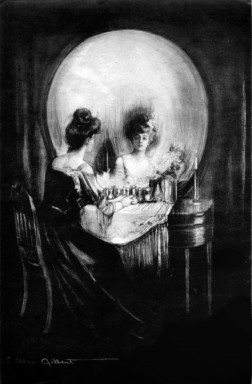
“The PWR BTTM Debacle Demonstrates Why Queer Politics Don’t Protect Women.”
A very silly notion, very popular at the moment, is that a man in a dress is a friend to women. For this helpful contribution to mass brain-death, we can thank the mainstreaming of queer politics, which have entered popular culture with predictable ease, since substanceless and entirely in sympathy with the masculinist-capitalist love affair with hyper-individualism. The queer theory posit is that gender has little to do with the male-dominant social hierarchy of patriarchy, or the colonization of each individual’s consciousness in service of that hierarchy’s maintenance; it’s all a matter of how you accessorize, so if you’re quite unique and against the grain you can costume your way out of oppression, whether you were originally in the role of the oppressor or the oppressed. You, personally, can do this. The overarching oppressive structure shaping the material reality that has been and is inescapably the context for your existence, in which you were raised and from which you inherited your understanding of the world, may remain intact, but you cannot possibly be expected to concern yourself with something so depressing as reality. It’s not fun, not sexy, and the associated shopping opportunities are minimal. Here’s the new mantra: Don’t try to change society, just change your outfit.
A man, in order to demonstrate he is not one of these masculine brutes we’ve heard about but instead someone sensitive to women, need only apply a coating of mascara and espouse an affection for sequins. He smears some lipstick on his mouth so we can be assured he has renounced the “toxic” content of his manhood, e.g., a sense of entitlement to women’s bodies, an infatuation with sexual force and a willful disregard for the feelings of others. He has embraced “the feminine”: he is on women’s side! The logic proceeds: he must be “an ally,” he has great taste in crop-tops, he would never hurt a woman, have you seen his collection of platform heels?
Although it conveniently relieves one of the burden of social responsibility to imagine we might all overcome or at least opt out of the dominant paradigm by means of personal ornamentation, gender is not primarily a matter of surface signifiers and individual performance – hence an arena for carnivalesque free play – but instead must be understood as an instrument of patriarchal subjugation, an ideology that encodes into human subjects varying behaviors and conventions of being//thinking according to their sex and the role their sex allots them within the social order, to ensure that each individual will be involved in the reproduction of the sex caste system, Men over Women.
PWR BTTM singer Ben Hopkins is a man whose queer image and all-important identity entails makeup and glitter stars and cute dresses, the superficial signs of “the feminine” (which is itself a patriarchal artifact having nothing to do with women as beings and everything to do with women as men’s inferiors within patriarchy). Ben Hopkins is also a man who insulted, sexually harassed, and raped women. The “feminine” glitter stars Hopkins wore did not preclude the male abusiveness Hopkins practiced, an apparent truth that queer politics cannot sufficiently address, in the same way that a superficial remedy cannot treat a deep wound. Paste the sparkliest band-aid on my slashed wrist and I’m still hemorrhaging. A more radical solution is required: we actually have to think (unfun as it may be) – rigorously and without self-indulgence – about what gender is, how it works, rather than merely what gender looks like. As the author of the article linked above, Jen Izaakson, writes, “Because gender is what naturalizes…male dominance and entitlement, gender non-conformity actually means pushing back against gendered power relations in concrete ways.” It does not mean making a fashion statement. Put simply, a man in a dress is no friend of women until he proves he’s not the same asshole he was when he was wearing ripped jeans and buffalo check.
